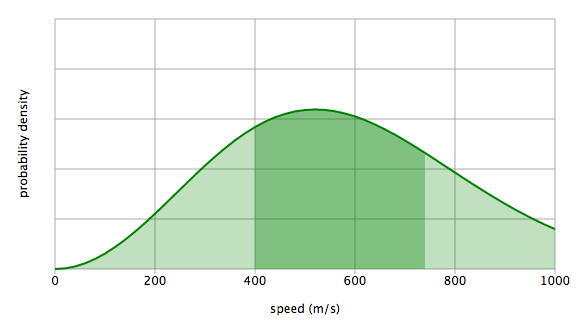We know that the molecule of hot water($H_2O$) has more energy than that of cold water (temperature = energy) and according to Einstein relation $E=mc^2$ ,this extra energy of the hot molecule has a mass. Does that make the hot molecule heavier?
4 Answers
According to http://www.verticallearning.org/curriculum/science/gr7/student/unit01/page05.html , the average velocity of a water molecule at 20C is approximately 590 m/s:

If you now calculate the difference in mass between water molecules "at rest" and moving at 590 m/s, this ratio is given by
$$\gamma=\sqrt{\left(1-\frac{v^2}{c^2}\right)}$$
Expanding this for the case where $v<<c$, we get
$$\frac{\delta m}{m} = \frac12\left(\frac{v}{c}\right)^2 \sim 2\cdot10^{-12}$$
The difference is there; it might be measurable; but it is very, very tiny. Any condensation on your colder sample will be many times heavier than the difference in mass.
Note that the above calculation is for "cool water" vs "water at absolute zero". The difference between "hot" and "cold" water will be even smaller. Also note that to do this calculation properly, you really need to evaluate the expression for $\gamma$ at every velocity, and integrate. This doesn't change the basic answer: "yes it changes; but it is a very very small change".
$E^2 = m^2c^4 + p^2c^2$, where $m$ is rest mass and $p$ is momentum. If a molecule is moving faster it would have more momentum and more energy, but the same rest mass.
Some have defined "relativistic mass" as opposed to "rest mass" as $E=m_rc^2$, so yes the faster moving molecule would have a greater so-called relativistic mass.
-
2$\begingroup$ How evil not to provide a ROM value for the change in mass :-) $\endgroup$ Commented Apr 21, 2014 at 14:44
I am going to take a different approach from DavePhD and Floris.
"Hot"ness or temperature more generally is a thermodynamic idea, and can't really be applied to an individual molecule. Dave and Floris have avoided the issue by simply comparing and energetic molecule with a less energetic one, and that is reasonable, but it makes their answers frame-of-reference dependent. Presumably they are working in the rest frame of the macroscopic samples from which they drew their test particles. All very reasonable.
I'm going to make my usual argument about scale of inspection.
A mole of hot water is more massive than a mole of cold water because when examined at the human scale you can't differentiate the kinetic energy of the molecules from any other form of internal energy (and energy is mass). The scale of this change is that figured by Floris.
Examined at the level of a single molecule than each particle has the same mass--properly defined as the Lorentz scalar formed by contracting it's four-momentum with itself: $m^2 = \bar{p}\cdot\bar{p}$--and the fast molecule has more kinetic energy--$T = E^2 - m^2 = (\gamma - 1)m$--than the slow one. This approach follows the conventions of particle physics where we don't use the term "relativistic mass".
The upshot is a "Yes and no" answer, or perhaps a "You're not quite asking the right question".
-
$\begingroup$ I respectfully disagree: temperature is a measure of the logarithm of the number of available energy states, so even a single molecule can have a temperature. I'm of the position that your linked Q&A does not support your position. $\endgroup$ Commented Apr 21, 2014 at 17:08
-
1$\begingroup$ @CarlWitthoft While I agree with you, just wanted to point out that your definition in your comment is that of entropy not temperature. reciprocal temperature however CAN be likented to the derivative of the entropy w.r.t. energy I believe. $\endgroup$ Commented May 19, 2021 at 1:54
-
$\begingroup$ @R.Rankin Thanks; I appreciate the correction (too long since I was in the classroom) $\endgroup$ Commented May 19, 2021 at 12:26
Hot water is lighter. Hot water molecules take up more space.
-
1$\begingroup$ This is cute, if false. Is a pound of bricks heavier than a pound of feathers? $\endgroup$ Commented May 17, 2017 at 15:03
